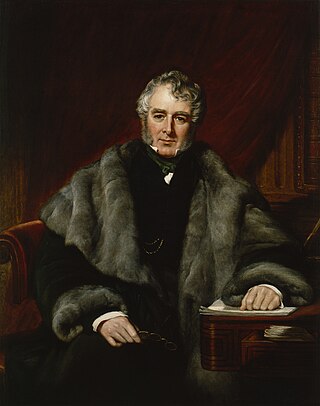
William Lamb, 2nd Viscount Melbourne, in some sources called Henry William Lamb, was a Whig politician who served as the Home Secretary and twice as the Prime Minister of the United Kingdom.

Robert Walpole, 1st Earl of Orford,, known between 1725 and 1742 as Sir Robert Walpole, was a British statesman and Whig politician who, as First Lord of the Treasury, Chancellor of the Exchequer, and Leader of the House of Commons, is generally regarded as the de facto first Prime Minister of Great Britain.
The Radicals were a loose parliamentary political grouping in Great Britain and Ireland in the early to mid-19th century who drew on earlier ideas of radicalism and helped to transform the Whigs into the Liberal Party.
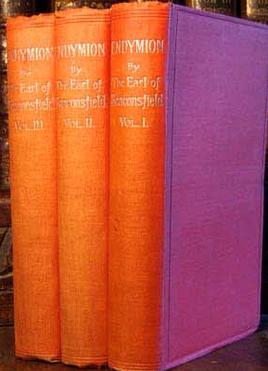
Endymion is a novel published in 1880 by Benjamin Disraeli, 1st Earl of Beaconsfield, the former Conservative Prime Minister of the United Kingdom. He was paid £10,000 for it. It was the last novel Disraeli published before his death. He had been writing another, Falconet, when he died; it was published, incomplete, after his death.
Coningsby, or The New Generation is an English political novel by Benjamin Disraeli, published in 1844.

Fashionable novels, also called silver-fork novels, were a 19th-century genre of English literature that depicted the lives of the upper class and the aristocracy.

The Separation is an 1830 novel by the British writer Lady Charlotte Bury, published in three volumes. It falls into the tradition of silver fork novels, popular at the time. It was published in New York by Harper the same year in two rather than three volumes. It was published anonymously, although Bury's authorship was widely known. A reviewer attacked it for recycling the plot entirely from Bury's 1812 novel Self-indulgence, although the resulting publicity seemed to help the novel's sales.

The Exclusives is an 1830 novel by the British writer Lady Charlotte Bury, originally published in three volumes. It is part of the then-popular genre of silver fork novels set in high society. It was also published in New York City by Harper the same year in two rather than three volumes. Although the daughter of a duke herself Bury, writing anonymously, used it as an expose of the manners and behaviour of the elite Ton.

Flirtation is an 1827 novel by the British writer Lady Charlotte Bury, originally published in three volumes. Bury, writing anonymously, was a well-known author of silver fork novels set in high society. It was a popular success and quickly ran through three editions.

The Disowned is a novel by the British writer Edward Bulwer-Lytton, originally published in three volumes. It is part of the then-popular genre of silver fork novels, focusing on British high society of the late Regency era. Like many other silver fork novels it was published by Henry Colburn, with the first volume coming out in 1828 and the latter two in 1829. It is set in the late eighteenth century but the political and social themes it refers to have more relevance to the contemporary 1820s.
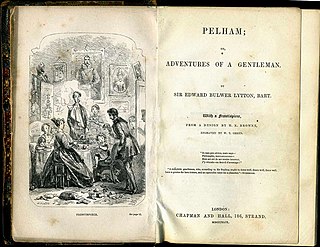
Pelham is an 1828 novel by the British writer Edward Bulwer-Lytton, originally published in three volumes. It was his breakthrough novel, launching him as one of Britain's leading authors. It is part of the tradition of silver fork novels that enjoyed great popularity in the late Regency and early Victorian eras. It follows the adventures of Henry Pelham, a young dandy, in Paris, London and the fashionable spa town of Cheltenham.
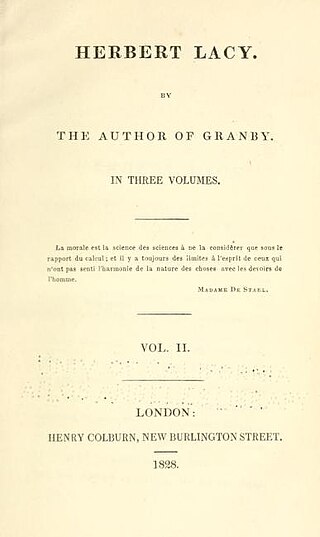
Herbert Lacy is an 1828 novel by the British writer Thomas Henry Lister, originally published in three volumes. It was part of the then-popular genre of silver fork novels depicting life in the high society of late Regency Britain. It was his second novel following Granby (1826). Much of the plot revolves around politics, with the title character elected to Parliament. It also examines the alliance between the aristocracy and growing middle classes Like many of the silver fork novels it was published by Henry Colburn.

Falkland is an 1827 Gothic novella by the British writer Edward Bulwer-Lytton. It was his first published novel and took inspiration from Johann Wolfgang Goethe's The Sorrows of Young Werther. The protagonist was likely partly based on Bulwer-Lytton himself. The novel enjoyed success in Germany, but was criticised in Britain as immoral. It was followed by Pelham in 1828, in which he switched to the fashionable silver fork genre, which established him as leading writing in Britain and Europe.

Yes and No is an 1828 novel by the British writer and politician Lord Normanby, originally published in two volumes. It was part of the popular genre of silver fork novels which focused on the British upper classes in the later Regency era. It was his second published work following Matilda in 1825. The novel focuses heavily on the politics of Britain in the late 1820s, focusing on three main protagonists and examining the Whigs, liberal Tories, and Ultra-Tories.

Matilda is an 1825 novel by the British writer and politician Lord Normanby, originally published in two volumes. It was part of the emerging, popular genre of silver fork novels which focused on the fashionable British upper classes in the later Regency era, and was his first published work. He followed it with a second silver fork novel, the political Yes and No in 1828.

The Contrast is an 1832 novel by the British writer and politician Lord Normanby, originally published in three volumes. It was his third novel following Matilda (1825) and Yes and No (1828), all three of which were part of the developing silver fork genre focused on the fashionable aristocracy and upper classes of the late Regency period. It was written at the time of the Reform Act and examines the mixing of relationships across classes.
Granby is an 1826 novel by the British writer Thomas Henry Lister, published in three volumes. His first novel, it was part of the emerging genre of silver fork novels which take place in fashionable upper class settings of Regency Britain.
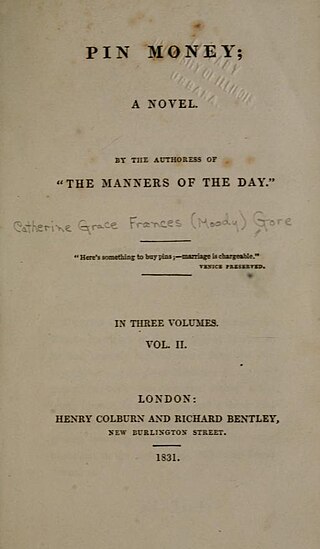
Pin Money is an 1831 novel by the British writer Catherine Gore, originally published in three volumes. It was part of the group of silver fork novels published during the later Regency era that focuses on life in the fashionable British upper classes. The Westminster Review considered the male characters to be more skilfully drawn than the female. Another review suggested that there was too much product placement in the novel, advertising the goods of various London shops.

The Tuileries is an 1831 novel by the British writer Catherine Gore. A bestselling writer of silver fork novels, Gore turned in this to the recent history of Paris following the French Revolution and particularly the Tuileries Palace. Gore herself had a low opinion of the work and when her publisher Richard Bentley asked her to write a review of itshe declined observing it was "a very dull work" and that she "could find little to say its favour" concluding that "the public must be more dense than I dare hope, if they can be persuaded that it is really a work of interest". It was one of two novels that Mary Shelley sent for in May 1831 along with Benjamin Disraeli's The Young Duke.
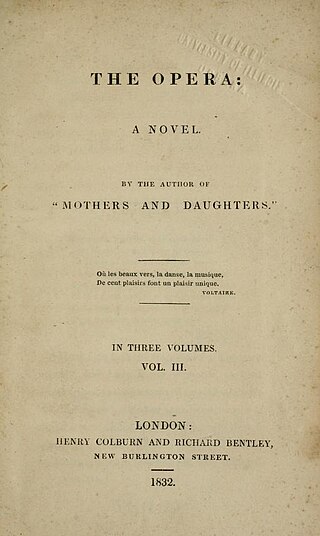
The Opera is an 1832 novel by the British writer Catherine Gore, originally published in three volumes. It is part of the tradition of silver fork novels focusing on British high society of the later Regency era. One contemporary reviewer launched a critical attack on its elitism, and lack of realism about everyday lives. The novel makes many references to the ongoing debate about the Reform Bill.
















